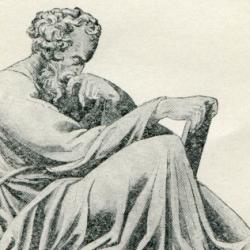For Aquinas, knowledge begins with sense perception. ‘Our natural knowledge takes its beginning from sense. Therefore it can extend only so far as it can be brought by (reflection on) the things of sense.’ (S.T., Ia, 12, 12) Neither a strict empiricist, nor a strict rationalist, though Aquinas believed that though knowledge starts with sense perception, it’s completed in abstraction – experiencing the particulars and reasoning towards universals.
Knowledge of God entails both this metaphysical inference as well as a faith dimension as God infinitely exceeds the limits of our rationality. At the same time, the reason/faith relationship is not opposed, just represent different dimensions of knowledge. Metaphysics is the bedrock of faith for Aquinas – hence natural theology: “The existence of God and other like truths about God, which can be known by natural reason, are not articles of faith, but are preambles to the articles; for faith presupposes natural knowledge, even as grace presupposes nature and perfection the perfectible.” (S.T. Ia, q. 2, a. 2)
In his book Aquinas, the late F.C. Copleston (1907-1994), a renown Thomist, Jesuit priest, and historian of philosophy, nicely lays out some key concepts such as the knowledge of God derived from metaphysical speculation, the limits of such metaphysical speculation, and the place for revelation that builds upon metaphysical knowledge:
“We cannot avoid using some image or symbol, even though we know that God is not a material thing… Not even the philosopher can free himself from the mind’s dependence on sense-perception. Any pretended disclosure of the divine essence, any unveiling of the inner nature of God, by the power of speculative reason would thus be for Aquinas no more than pseudo-knowledge… Our natural dependence on sense-experience and the imagination renders it impossible for us to penetrate the divine essence. If we attempt to do so with Hegel, the result will be a progressive elimination of the divine transcendence and the creation of a caricature of the unfathomable mystery of God… Aquinas thought that philosophic reflection gives us knowledge of what He is not rather than of what He is. The metaphysician cannot transcend the limitations of the human mind which are common to himself and others… Thus we can have a natural knowledge of God only in so far as finite things themselves point beyond themselves and manifest the existence of that on which they depend. Hence the proofs of the existence of God say something primarily about things, the things which fall within the field of experience. They say that these things depend on something which transcends them. They cannot give the philosopher or anyone else an intuition of God. Any more immediate experience of God must be supernatural in character and the work of God Himself within the soul; it cannot be obtained by philosophical analysis and reflection.” (pages 43-46)
Image credit: Baristas Co

















